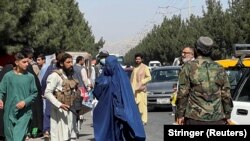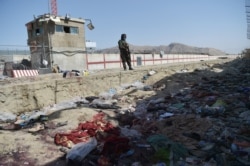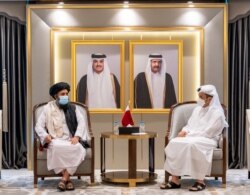On August 22, Islamabad-based White News ran a sensationalist news item, “Why Indian media is continually blaming Pakistan for the fall of Kabul.”
White News claims to base its “storytelling on facts rather than speculations,” adding it entertains “no bias in accommodating all shades of opinion.”
But in practice, its content is highly speculative and conspiratorial, with positions that clearly align with those of the Pakistani government.
In its August 22 report, White News attempts to counter the narrative that Pakistan had a hand in bringing the Taliban to power.
Heavy on rhetoric, it employs ‘what about it’ arguments to claim that India, Pakistan’s historic rival, would be willing to use the Taliban to achieve its political goals.
At one point, the presenter, Hira Mustafa, rhetorically asks whether it was Pakistan or the United States that engaged in negotiations with the Taliban. She then goes on to argue that these negotiations lent credibility to the militant group, which on August 15 captured the Presidential Palace in Kabul and now controls Afghanistan.
“According to the U.S. Constitution, the U.S. government can never negotiate with a terrorist group, no matter what happens,” Mustafa said. “So when the U.S. was negotiating with the Taliban, obviously the U.S. recognized the legitimacy of the Taliban.”
That is false. The U.S. Constitution makes no mention of negotiating with terrorists, and the willingness to negotiate with the Taliban does not mean the U.S. views them as legitimate rulers.
First, some history.
The word ‘terrorism’ did not enter the English language until 1795, approximately five years after the U.S. constitution was ratified. Its roots are in the 1793-1794 Reign of Terror in France, a period in the French revolution marked by massacres and public executions. The word was first recorded in English dictionaries in 1798, defined as the “systematic use of terror as a policy.”
None of the 27 constitutional amendments – the last of which was ratified in 1992 – have addressed or prohibited negotiations with terrorists.
To be sure, successive U.S. presidential administrations have declared a policy of not negotiating with terrorists. The policy has been traced to the 1970s presidency of Richard Nixon and the refusal to negotiate with Palestinian militants who kidnapped (and later killed) two U.S. diplomats taken hostage in Khartoum, Sudan.
Former President Ronald Reagan once said, “America will never make concessions to terrorists,” in what was largely described as a no-concessions policy. Likewise, former President George W. Bush said, “No nation can negotiate with terrorists, for there is no way to make peace with those whose only goal is death.”
Some have argued that “any concessions to terrorist demands are prohibited” under the U.S. criminal code, which makes it “unlawful, within the United States, or for any person who is subject to the jurisdiction of the United States anywhere, to knowingly provide material support to a foreign terrorist organization that has been designated by the Secretary of State.”
But a number of U.S. administrations have negotiated with terrorists or militants, either directly or through back channels.
That includes efforts to free Americans taken during the 1979-1981 Iran hostage crisis, the hijacking of TWA Flight 847 in June 1985 by Lebanese militant-group Hezbollah, and the release in 2014 of Army Sgt. Bowe Bergdhal in exchange for five Taliban detainees being held at Guantanamo.
It should be noted the Taliban does not appear on the U.S. State Department’s list of foreign terrorist organizations. However, the militant group has been sanctioned by the U.S. Treasury, as have some of its leaders.
Some Taliban members, like Supreme Commander Haibatullah Akhundzada, do not appear on U.S. or U.N. sanctions lists.
Taliban co-founder Abdul Ghani Baradar and political head Sher Mohammad Abbas Stanikzai have been sanctioned by the U.N. European Union, China and Russia, but not the United States.
Other Taliban leaders, like Sirajuddin Haqqani and Mohammad Yaqoob, are sanctioned by the U.S.
In July 2018, the administration of former President Donald Trump ordered direct talks between U.S. officials and the Taliban. Not being subject to sanctions, Barader and Stanikzai lead the Taliban’s negotiating team.
The talks culminated in a February 29, 2020, peace agreement, which set the stage for the U.S. troop pullout, the Taliban’s rapid takeover of Afghanistan, and the mass evacuations now under way.
That agreement specifically states that the United State does not recognize the Islamic Emirate of Afghanistan, which was established by the Taliban in 1996.
Still, in the ensuing chaos of the U.S. withdrawal, talks continued.
On August 23, the Washington Post reported that CIA Director William J. Burns held a secret meeting in Kabul with Baradar. Evacuation operations were reportedly brought up in the meeting.
For its part, Pakistan has long denied supporting the Taliban, despite a large body of evidence to the contrary.
Carlotta Gall, a British journalist and author who covered Afghanistan and Pakistan for The New York Times for over a decade, has argued that Pakistan’s government and Inter-Services Intelligence (ISI) agency was largely responsible for the carnage in Afghanistan, going so far as to argue the U.S. was “fighting the wrong enemy, in the wrong country.”
That includes a July 7, 2008, suicide bomb attack outside the Indian Embassy in Kabul that killed 54 people, including an Indian defense attache. U.S. intelligence concluded the ISI was involved in planning that attack.
Former Pakistani President Pervez Musharraf, while never implicating the government directly, gave a partial admission in 2007 that some government officials had turned a blind eye in allowing Taliban fighters sanctuary in Pakistan.
Numerous analysts have viewed Pakistan’s covert backing of the Taliban as a means of securing a regional ally against its prime adversary, India.
The White News report lines up with the Taliban’s drive for international recognition. One senior Taliban member told VOA on August 24 that the group is seeking legitimacy on the world stage.
Just days before the Taliban takeover of Kabul, however, U.S. special envoy for Afghan peace, Zalmay Khalilzad, said the Taliban “will become a pariah state” if they take the country over by force.
In July, as the Taliban began rapidly doing just that, Pakistani Prime Minister Imran Khan was interviewed on the PBS News Hour.
“I think the U.S. has really messed it up in Afghanistan,” Khan said. “First of all, they tried to look for a military solution in Afghanistan when there never was one.
“People like me were called anti-American. I was called ‘Taliban Khan’,” he continued. “I don’t know what the objective was in Afghanistan, whether it was to have some nation building, or democracy or liberate the women, whatever the cause was, the way they went about it was never going to be the solution.”
After the Taliban entered Kabul, Khan was quoted in media reports saying the takeover was “breaking the chains of slavery” in Afghanistan.








